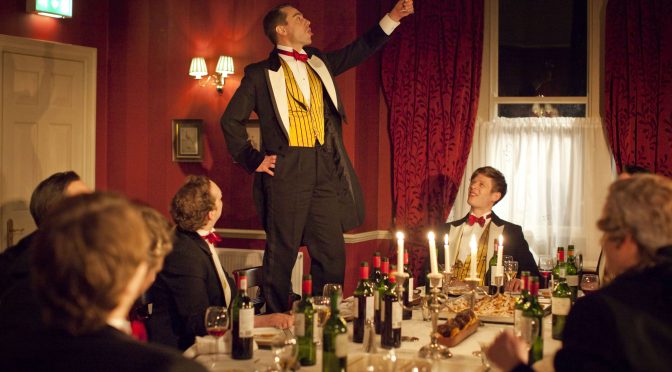There’s seldom a shortage of political plays in London and, in an election year, writers are keener than ever to deal with meaty issues. Laura Wade’s Posh promises a novel take on current affairs by allowing us an insight into one of those Oxford dining clubs beloved of Messrs Cameron and Johnson. It’s a good starting position, but what makes the play really clever is that it deals with so much more.
Fascination with power is always a great ingredient for good drama – what forms and drives those in charge? Wade sets out to inform us. In this case, the elite Riot Club diners are born to rule and very much aware of this fact.
Great humour comes from the plentiful clichés about such characters as their revolting snobbery is combined with the arrogance and ignorance of youth. It’s entertaining stuff, but these guys are easy targets. Again Wade provides more. Like all children of the baby boomers these toffs could be the first generation in history to be worse off than their parents. Angrily interpreting the current state of the nation, they see that if they don’t change things, they might have to stop being posh.
The large cast does a great job of making each character distinct despite belonging to a limited social world. In a variety of ways, each exposes their weaknesses and is played with by the others. They are vicious to each other as only schoolboys can be while their amateur manoeuvrings have a pathetic touch. Joshua McGuire, who is still in his final year at RADA, stands out as Guy. More than most he is utterly clueless and desperate to gain approval. Leo Bill plays Alistair, notable for the frightening anger he conveys and his palpable confusion in the face of what he regards as the injustices of the world.
The play is bookended by meetings with Guy’s godfather Jeremy. Performed with sinister aplomb by Simon Shepherd, he is an MP on the look out for future talent. Shepherd is perfectly cast as the man these boys will grow up to be. If this sounds a little too conspiratorial, bear in mind that the idea of such dining clubs containing undergraduates plotting to control the country is well avoided here. Wade sets out empty, rambling arguments full of powerful emotion but safely removed from political reality.
It might seem odd but, for my money, the star roles are the smallest ones. Fiona Button plays the toffs’ waitress and Charlotte Lucas a prostitute hired by the club. The women carry themselves with a sense of dignity and purpose that the club-members lack. Their articulacy renders the men speechless – until they leave the room.
Added to all these great performances come some surprises. Surreal touches are added that make director Lyndsey Turner’s production speed along. A capella interludes where the club sing inappropriate versions of R’n’B numbers require that musical director James Fortune earns a special mention. The songs are great fun and serve as a wonderful reminder of how anachronistic the club is. A guest appearance by the club’s founder, Earl Riot, who possesses Toby (Jolyon Coy) in his drunken stupor, also changes the tempo of the piece.
All this combines to create a great evening at the theatre. Undoubtedly some will claim that the observations about class and politics are too broad but the insight into youth and group dynamics are spot on. Behind this, a great ear for dialogue and skill at creating dramatic situations should compel our politicians to watch this for tips on how to engage an audience, if nothing else.
Until 22 May 2010
Photo by Johan Persson
Written 19 April 2010 for The London Magazine

